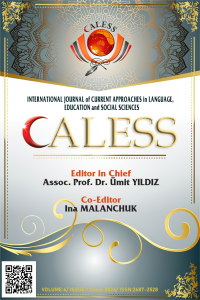Erratum
Research Article
Aim & Scope
CALESS aims to share original and qualified research in the fields of language, language education, education and social sciences, and to offer solutions to the problems in the related fields and to contribute to the existing literature in these fields.
CALESS welcomes the following types of submissions:
- Empirical Research
- Conceptual Research
- Case Studies
- Literature Review
- Viewpoint
- Historical View
- Letter to the Editor
- Short Report
- Book Review
In the the following fields:
Language Education
- Language teaching
- First, second or foreign language teaching/learning
- Applied linguistics
- Bilingual and multilingual education
- Theories and practices in language teaching/learning
- Teaching of specific skills
- Teaching for specific purposes
- Literature, language and linguistics
- Teacher training
- Cross-cultural studies
- New technologies/trends/practices in language teaching/learning
- Pegagogical techniques
- Testing and evaluation
Educational Sciences
- Curriculum and instruction
- Program development and evaluation
- New approaches/methods/practices in education
- Educational practices
- Adult education
- Educational administration/policy/planning
- Measurement and evaluation in education
- Psychological counselling and guidance
- Teacher traning (pre-service/in-service teacher training practices)
- Use of technology in education
Social Sciences
- Philology, Philosophy, History, Geography
Note: Studies in social sciences are limited to the above four disciplines. Studies conducted outside these disciplines are not accepted.
The manuscripts submitted to the CALESS are rejected or sent back by the editor or the editorial board if the format and content is not suitable.
Author Guidelines
CALESS uses double-blind peer review technique.
The studies submitted to the CALESS should not have been previously published and should not be in the process of evaluation in another journal. The authors assume full responsibility for this issue.
The submissions are reviewed by the editorial board in terms of form and shape properties. While the studies that do not possess the requisite qualification are sent back to authors, the evaluation process is started for the ones approved by the editorial board.
The studies which are in the process of evaluation are sent to at least two independent reviewers in the relevant field. While assigning reviewers, both double-blind review and external review process are followed. Special attention is paid to the fact that the reviewers are not from the same institution as the author (s) who submitted the study.In line with the double-blind peer review, the identities of the reviewers and the author (s) are hidden from each other. Signs that may reveal the identity of the reviewer or author (s) are hidden. The documents submitted by the author (s) and reviewers are subject to preliminary review by the editorial board and the traces on the documents are removed.
After the Article Evaluation Process, the studies are;
- published if both reviewers report "CAN BE PUBLISHED".
- sent back to authors for making revisions stated by reviewer/s if one or both of the reviewers report "CAN BE PUBLISHED WITH REVISION".
- sent to the third reviewer if one of the reviewers reports "CAN NOT BE PUBLISHED" and evaluation process is carried out based on the report of this reviewer.
Writing Rules
The format and shape properties for the studies sent to the International Journal of Current Approaches in Language, Education and Social Sciences (CALESS) should be as follows:
Page Format: A4 Vertical, Margins (Normal), Justified, Line spacing 1,15
Font properties: Font type: Palatino Linotype; Font sizes: 12 (bold) for Main titles,12 for text .
Text properties: Indents should not used in text. 6 nk space should be left before and after the paragraphs.
Tables and Figures: Tables and figures should be prepared according to the updated APA Citation Guide. Titles of the tables should be italicised.
Main Title and Author Information: The main title of the study: Palatino Linotype, 12 (font size), capitalised each letter, centred and written bold.
Author information: Name-surname (11-font size) and centred. If there are more than one author, their names should be written side by side according to their contribution to the study. Footnote: affiliation, university, department-division, city, country and e-mail address
Special cases: If the study was presented as a proceeding in any scientific organisation, it should be stated below the first page of the article by placing im (*) in the title of the article.
The studies sent to the journal should include the following titles:
Title
The title of manuscripts should reflect the content clearly.
Abstract
It should cover the purpose of the study, its method, significant features and results briefly and clearly. It should be approximately 150-250 words.
Keywords
Minimum 3, maximum 5 keywords that reflect the scope of the study should be selected.
Introduction
It should include summary for the state of research problem. It should be supported with the studies in the relevant literature.
Method
The method of the study should include the following sub-titles : Research Design, Study Group (Population-Sampling), Data Collection Tools (Research Data), Data Collection Process and Data Analysis.
Findings
The findings should be presented by using quantitative, qualitative or mixed method analysis techniques based on the predetermined purposes of the study.
Conclusion*
The obtained findings of the study should be explained.
Discussion*
The obtained findings should be discussed with the relevant literature and author's comments.
Suggestions*
In accordance with the conclusion and discussion sections of the study, suggestions should be put forth for practitioners, program developers, researches etc.
References
References should be prepared according to the updated APA Citation Guide (7th Ed.) and should be listed in alphabetical order.
* The titles (Conclusion, Discussion and Suggestions) can be given either together or separately.
**In cases where the appendices are given, they should be given in headings as others.
*** The studies written in English do not need to add an abstract in other languages.
SAMPLE REFERENCES
Book
Yıldız, Ü. (2010). Applied Turkish 3. Asar Publishing.
In-text citation: Yıldız (2010), (Yıldız,2010), (Yıldız,2010:45)
Edited Book
Hacker Hughes, J. (Ed.). (2017). Military veteran psychological health and social care: Contemporary approaches. Routledge.
In-text citation: Hacker Hughes (2017), (Hacker Hughes, 2017), (Hacker Hughes, 2017: 48)
Chapter in an Edited Book
Balsam, K. F., Martell, C. R., Jones, K. P., & Safren, S. A. (2019). Affirmative cognitive behavior therapy with sexual and gender minority people. In G. Y. Iwamasa & P. A. Hays (Eds.), Culturally responsive cognitive behavior therapy: Practice and supervision (2nd ed., pp. 287–314). American
Psychological Association.
In-text citation: Aktay (2015), (Aktay, 2015), (Aktay, 2015:428)
Translated Book
Lewis, B. (2000). Emergence of modern Turkey (M. Kıratlı, Trans.).Turkish Historical Society.
In-text citation: Lewis (2000), (Lewis, 2000), (Lewis, 2000;34)
Journal Article (Electronic)
Nikishova, A., & Kryvonosova, E. (2020). Design and implementation of technologies for professionally oriented adult education. International Journal of Current Approaches in Language, Education and Social Sciences, 2(1), 413-424.https://doi.org/10.35452/caless.2020.20
In-text citation: Nikishova and Kryvonosova (2020), (Nikishova & Kryvonosova, 2020), (Nikishova & Kryvonosova, 2020: 418)
Note: For articles that are electronic but do not have a DOI number, a link to the article should be provided in the DOI number field.
Journal Article (Printed)
Nikishova, A., & Kryvonosova, E. (2020). Design and implementation of technologies for professionally oriented adult education. International Journal of Current Approaches in Language, Education and Social Sciences, 2(1), 413-424.
In-text citation: Nikishova and Kryvonosova (2020), (Nikishova & Kryvonosova, 2020), (Nikishova & Kryvonosova, 2020: 418)
Thesis (M.A./PhD.)
Asma, B. (2018). Examining the relationship between English admission test (LYS-5) and four language skills of undergraduate students [Unpublished master's thesis]. Akdeniz University Graduate School of Educational Sciences.
In-text citation: Asma (2018), (Asma, 2018), (Asma, 2018:15)
Prooceding
Williams, J., & Seary, K. (2010). Bridging the divide: Scaffolding the learning experiences of the mature age student. In J. Terrell (Ed.), Making the links: Learning, teaching and high quality student outcomes. Proceedings of the 9th Conference of the New Zealand Association of Bridging Educators (pp. 104-116). Wellington, New Zealand.
In-text citation: Williams and Seary (2010), (Williams & Seary, 2010), (Williams & Seary, 2010:92)
Web Page
World Health Organisation. (2020). Coronavirus Disease (COVID-19) Dashboard. https://covid19.who.int/
In-text citation: World Health Organisation (2020), (World Health Organisation, 2020)
Ethical Principles and Publication Policy
Ethical Principles and Publication Policy
PUBLICATION ETHICS
Responsibilities of the Authors
Responsibilities of the Referees
Responsibilities of the Editors
PUBLICATION POLICY
1. CALESS is an international refereed journal in which scientific articles in the field of language, language education, educational and social sciences are published in Turkish, English and russian. The journal publishes two issues (June-December)2. The journal publishes scientific articles which have a general place in the community of research in teaching and come from various areas of research in teaching and related disciplines.
3. Additionally, on the term of not exceeding one per year, a special issue may be published on the current affairs in education and proceedings of the national/international meetings (symposium, convention, conference etc.).
4. Copyright royalties are not paid to the authors of the publications.
5. The manuscripts submitted to the journal are first subject to preliminary review by the Secretariat with respect to writing rules and suitability with the article template, and then forwarded to the Editor-in-Chief, and editors in the related field. The submitted articles are inspected with respect to publication, writing, qualification, content, research and ethical rules. The articles which are found to be not suitable are returned to the author without going through referee review.
6. All articles submitted to the journal are reviewed by at least two referees under the principles of double blind refereeing.
7. Articles which are found suitable by the editorial board are sent to at least two field referees. The authors re-send their articles by taking into account the revisions and suggestions stated in the assessment form prepared by the referees. The editorial board make the decision to whether or not publish the articles which are revised. Journal editors have the right to make revisions, -even when the referee process is affirmative- and to make the decision of publishing or not. The articles which are decided to be published are sent back to the original author(s). The responsibility of the errors and writing mistakes belong to the author(s).
8. The authors who would like to withdraw their submission which is in the preliminary process are required to notify the demand through the article withdrawal form. An article which is approved and queued for publication cannot be withdrawn. Authors who submit articles to our journal accept this issue.
9. The editorial board is consulted for determining and updating the publication principles of the journal, and referee assignment process when needed.
10. The submitted articles cannot be published or submitted to be published to anywhere else. Otherwise, all legal responsibility belongs to the author(s).
11. Published or not published, the articles cannot be returned.
12. The journal is free of charge and does not require any payment including the submission and publication process.
13. Per author, maximum of one (1) academic research in each issue, and two (2) academic research in a year is allowed to be published.
14. All the articles published in the journal are open access and distributed under the conditions of "Creative Commons Attribution 4.0 International License" (CC BY 4.0).
15. Authors may request to exclude certain referees because of ethical reasons or conflict of interests.
16. Authors may object to the referee reports or editorial decisions. In such cases, the authors are requested to state their reasoning behind the objection. Editors may start a new reviewing process if deemed necessary after an objection.
17. The articles are submitted via the portal on https://dergipark.org.tr/caless. The articles which are attempted to be submitted otherwise will be disregarded. The referee process will also take place on the same system.
18. All articles submitted must be subject to preliminary review with respect to writing rules and journal template.
19. The authors are obligated to prepare their publications in accordance with 'APA 7 (American Psychological Association)' standards.
Price Policy
NO PUBLICATION FEE IS CHARGED from the studies submitted to the journal in the stages of submission, evaluation or publication.
Indexes
Other Indexes
Journal Boards
Editor-in-Chief
Editorial Board

 Web
Web
Lisans eğitimini Hacettepe Üniversitesi Eğitim Programları ve Öğretim Ana Bilim Dalı’nda tamamlayan yazar, yüksek lisans derecesini devlet bursuyla gittiği İngiltere Newcastle Üniversitesi Eğitim Bölümü’nden; doktora derecesini ise Orta Doğu Teknik Üniversitesi Eğitim Programları ve Öğretim Anabilim Dalı’ndan almıştır. TÜBA bursuyla Indiana Üniversitesi'nde; Fulbright bursuyla Boston Üniversitesi'nde; DAAD bursuyla Hamburg Üniversitesi'nde akademik araştırmalar yapmıştır. 2005 yılında Dr. Öğr. Üyesi olarak Atatürk Üniversitesi'nde görev yaptıktan sonra 2012 yılında Aydın Adnan Menderes Üniversitesi'ne geçmiştir. 2017 yılından bu yana profesör olarak görev yapmaktadır. Başlıca çalışma alanları; program geliştirme ve değerlendirme, değerler eğitimi, insan hakları ve demokrasi eğitimi, akademik yazma, nitel araştırma ve öğretmen yetiştirmedir.
Vilnius’ta dünyaya gelir. Araştırmacı, Türkolog, Tercüman 1988 yılında Vilnius Üniversitesi’nden mezun olduktan sonra Vilnius Üniversitesi Filoloji Fakültesi Slav Bölümü Litvanya Tatarları Bilim Dalı’nda araştırma görevlisi olarak göreve başlamıştır. Litvaya Tatarlarının resmi temsilcisi olan ve 2012–2015 yılları arasında Litvanya’da “Milli Azınlık Kurulu”nun başkanlığını yürüten Vilnius Üniversitesi Filoloji bölümünde Türkoloji alanında çalışan Mişkiniene, 2001 yılında “Litvan Filoloji ve Yabancı Dil (Türkçe)” ve 2008 yılında “Asya araştırmaları ve Türkoloji” programlarının kurucusudur. “Eski Litvan Tatarlarının El Yazmaları (İnceleme–Metin–Tercüme)” adlı monografi ile beraber Litvanya Tatarları’nın Tarihi, Kültürü, Geleneği ve Dini üzerine birçok makale ve kitap yazmıştır. Orhan Pamuk ve Ayşe Kulin’nin romanlarını Litvancaya çevirerek Türk edebiyatının Litvanya’da tanınmasına katkı yapmaktadır.
Current position is the Head of the Department of Intercultural Communication and Technical Translation at the BSTU


Prof. Dr. Mesut GÜN
Gazi Üniversitesi Eğitim Fakültesi Türkçe Eğitimi bölümü mezunudur. Yüksek lisans eğitimini Çukurova Üniversitesinde; doktora eğitimini ise Selçuk Üniversitesi Eğitim Bilimleri Enstitüsü’nde Türkçe Eğitimi alanında tamamlamıştır. 1998-2014 yılları arasında Millî Eğitim Bakanlığına bağlı ilk ve orta öğretim kurumlarında Türkçe öğretmeni, Uzman Türkçe öğretmeni ve Başöğretmen Türkçe öğretmeni olarak görev yapmıştır. 2014 yılında Nevşehir Hacı Bektaş Veli Üniversitesi Eğitim Fakültesi Türkçe Eğitimi Bölümüne Yrd. Doç. Dr. olarak atanmıştır. Burada Bölüm ve Anabilim dalı başkanlıkları görevleri yanında 2016-2017 yılları arasında TÖMER müdürü olarak Nevşehir Hacı Bektaş Veli Üniversitesinde idari görevler yapmıştır. 2017 yılında Doçent unvanı alan Mesut GÜN; 2020 yılı Ocak ayında Mersin Üniversitesi Türkçe Eğitimi Bölümüne Doçent kadrosu ile atanmış, 2022 yılında ise Profesörlük unvanı almıştır. Mersin Üniversitesi Türkçe Eğitimi Bölümündeki dersleri yanında Mersin Üniversitesi TÖMER Müdürü olarak 2021-2023 yılları arasında görev yapmıştır. Okuma eğitimi, dinleme eğitimi, konuşma eğitimi, yazma eğitimi ve özellikle Türkçenin yabancı dil olarak öğretimi alanlarında birçok makalesi ve tam metin bildirisi bulunan Prof. Dr. Mesut Gün’ün; Öğretim Teknolojileri ve Materyal Tasarımı alanında münferit bir kitabı, Türkçe Öğretimi ve Yabancılara Türkçe Öğretimi alanlarıyla ilgili birçok kitap bölümü bulunmaktadır. İyi derecede İngilizce, orta düzeyde Farsça, başlangıç seviyesinde Arapça ve Almanca bilen Prof. Dr. Mesut GÜN hayat boyu öğrenme idealiyle lisans seviyesinde altı üniversiteden mezun olmuş ve 2024 yılında Mersin Üniversitesi Sosyal Bilimler Enstitüsü Felsefe Bölümünde yüksek lisans eğitimine başlamıştır. Araştırma ve ilgi alanları arasında dil eğitimi ve öğretimi, edebiyat, felsefe, teoloji, yorum bilim, şiir, tarih, sosyoloji, uluslararası ilişkiler ve eleştiri yer almaktadır. Bilimsel araştırma ve yayınları yanında satranç ve masa tenisi gibi sporlara ilgi duymakta; Judo ile antrenör olarak, Aikido ile sporcu olarak ilgilenmeye devam etmektedir.










































